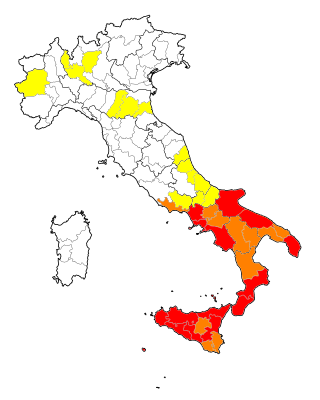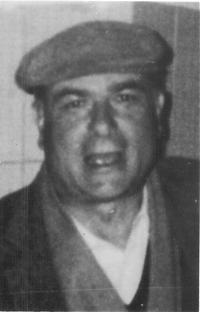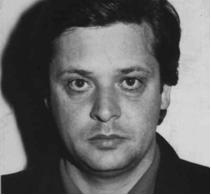The 'Ndrangheta is an Italian Mafia-type association based in the peninsular region of Calabria and dating back to the 19th century. Although loosely structured, it is considered one of the most powerful organized crime groups in the world. It is characterized by a horizontal structure made up of autonomous clans known as 'ndrine, based almost exclusively on blood ties. Since the 1950s, following wide-scale emigration from Calabria, 'Ndrangheta clans dispersed to other European countries, Australia and the Americas. Currently, its main activity is drug trafficking, but it also deals with arms trafficking, money laundering, racketeering, extortion, and loan sharking.
Sacra Corona Unita, also known as the Fourth Mafia, is a Mafia-type criminal organization from the Apulia region in Southern Italy, and it is especially active in the areas of Brindisi, Lecce, and Taranto.

Criminal organizations have been prevalent in Italy, especially in the southern part of the country, for centuries and have affected the social and economic life of many Italian regions. There are major native mafia-like organizations that are heavily active in Italy. The most powerful of these organizations are the Camorra from Campania, the 'Ndrangheta from Calabria and the Cosa Nostra from Sicily.

Giuseppe Morabito, nicknamed 'u tiradrittu, is an Italian criminal and a historical boss of the 'Ndrangheta, a Mafia-type organisation in the region of Calabria, in southern Italy. He hails from Africo in the Locride. He was a fugitive and on the list of most wanted fugitives in Italy from 1992 until his arrest in February 2004.

Salvatore Miceli is a member of the Sicilian Mafia. He was on the "Most wanted list" of the Italian Ministry of the Interior from 2001 until his arrest in Venezuela in June 2009. Some Mafia turncoats (pentiti) referred to Miceli as the Minister of Foreign Affairs, due to his frequent trips abroad. Others called him "the chicken that lays golden eggs", referring to his lucrative drug business.
Domenico Tripodo was an Italian criminal and a historical and charismatic boss of the 'Ndrangheta dominating the city of Reggio Calabria and the surrounding areas. Also known as Don Mico Tripodo he was one of the most powerful 'Ndrangheta bosses of his time, held in high respect by his criminal associates.

Giuseppe Coluccio is an Italian criminal and a member of the 'Ndrangheta, a Mafia-type organisation in Calabria. He was a fugitive and included in the list of most wanted fugitives in Italy from 2005 until his capture on 7 August 2008, in Toronto, Ontario, Canada.
The Cataldo 'ndrina is a clan of the 'Ndrangheta, a criminal and mafia-type organisation in Calabria, Italy. This particular 'ndrina is based in Locri, a hotbed of 'Ndrangheta activity. The clan, allied with the Marafioti family, is involved in a long blood feud with the Cordì 'ndrina, from the same town, since the end of the 1960s.
The Barbaro 'ndrina is a powerful clan of the 'Ndrangheta, a criminal and mafia-type organisation in Calabria, Italy. The 'ndrina belongs to the locale of the town of Platì. According to the Direzione Investigativa Antimafia, the Barbaro 'ndrina is one of the most powerful 'Ndrangheta clans. The clan also operates in the northern Italian regions of Lombardy, Piemonte and overseas in Australia, in particular in the Griffith, New South Wales area.
The Bellocco 'ndrina is a clan of the 'Ndrangheta, a criminal and mafia-type organisation in Calabria, Italy. The 'ndrina is based in Rosarno, on the Tyrrhenian coast, and belongs to the locale of that town, particularly very active in drugs trafficking, arms trafficking, extortion and control of commercial and entrepreneurial activities.
Giorgio De Stefano is an Italian criminal and a member of the 'Ndrangheta in Calabria, a Mafia-type criminal organisation in Calabria. He belongs to the De Stefano 'ndrina, based in the Archi neighbourhood in the city of Reggio Calabria, and is a cousin of the historical boss Paolo De Stefano. He has a degree in criminal law and is often referred to as "the lawyer". According to anti-mafia investigators, he represents "the brains" of the De Stefano clan, able to elaborate alliances and strategies, with a typically managerial approach, identifying the most lucrative criminal activities to be implemented.
Paolo Serraino, is an Italian criminal and a member of the 'Ndrangheta mafia-like organization in Calabria. He was born in Cardeto, about 10 km southeast of the city of Reggio Calabria.
The Serraino 'ndrina is a clan of the 'Ndrangheta, a criminal and mafia-type organisation in Calabria, Italy. The 'ndrina is based in Cardeto, about 10 km southeast of the city of Reggio Calabria. The Serraino clan is made up of two groups of brothers, first cousins.
The Camera di Controllo, is a collegial body of the 'Ndrangheta, a Mafia-type organisation in Calabria in Southern Italy. It is also known as La Provincia or Camera di Compensazione. It is composed of leading 'Ndrangheta members to decide on important questions concerning the organization and settling disputes.
The Pesce 'ndrina is a clan of the 'Ndrangheta, a criminal and mafia-type organisation in Calabria, Italy. The 'ndrina is based in Rosarno on the Tyrrhenian coast.
Roberto Pannunzi, also known as Bebè (Baby), is an Italian criminal from Rome linked to the 'Ndrangheta, a Mafia-type organisation in Calabria. He is one of the top cocaine brokers for the Sicilian Mafia and the 'Ndrangheta with the Colombian cocaine cartels. He has been described as "Europe's most wanted drugs trafficker", and the "biggest cocaine trafficker in the world", the equivalent of Pablo Escobar, the head of the Colombian Medellín Cartel. According to the United States Drug Enforcement Administration (DEA), the drug trafficking activities of Pannunzi have been documented for over 30 years.
Vincenzo Macrì is a member of the 'Ndrangheta, a criminal and mafia-type organisation in Calabria, Italy. He was born in Siderno on the Ionic coast of Calabria. He is the son of Antonio Macrì, a historical and charismatic boss of the 'Ndrangheta, whose murder in 1975 triggered a 'Ndrangheta war that cost some 300 lives.
The Mazzaferro 'ndrina is a clan of the 'Ndrangheta, a criminal and mafia-type organization in Calabria, Italy. The 'ndrina is based in Marina di Gioiosa Ionica.